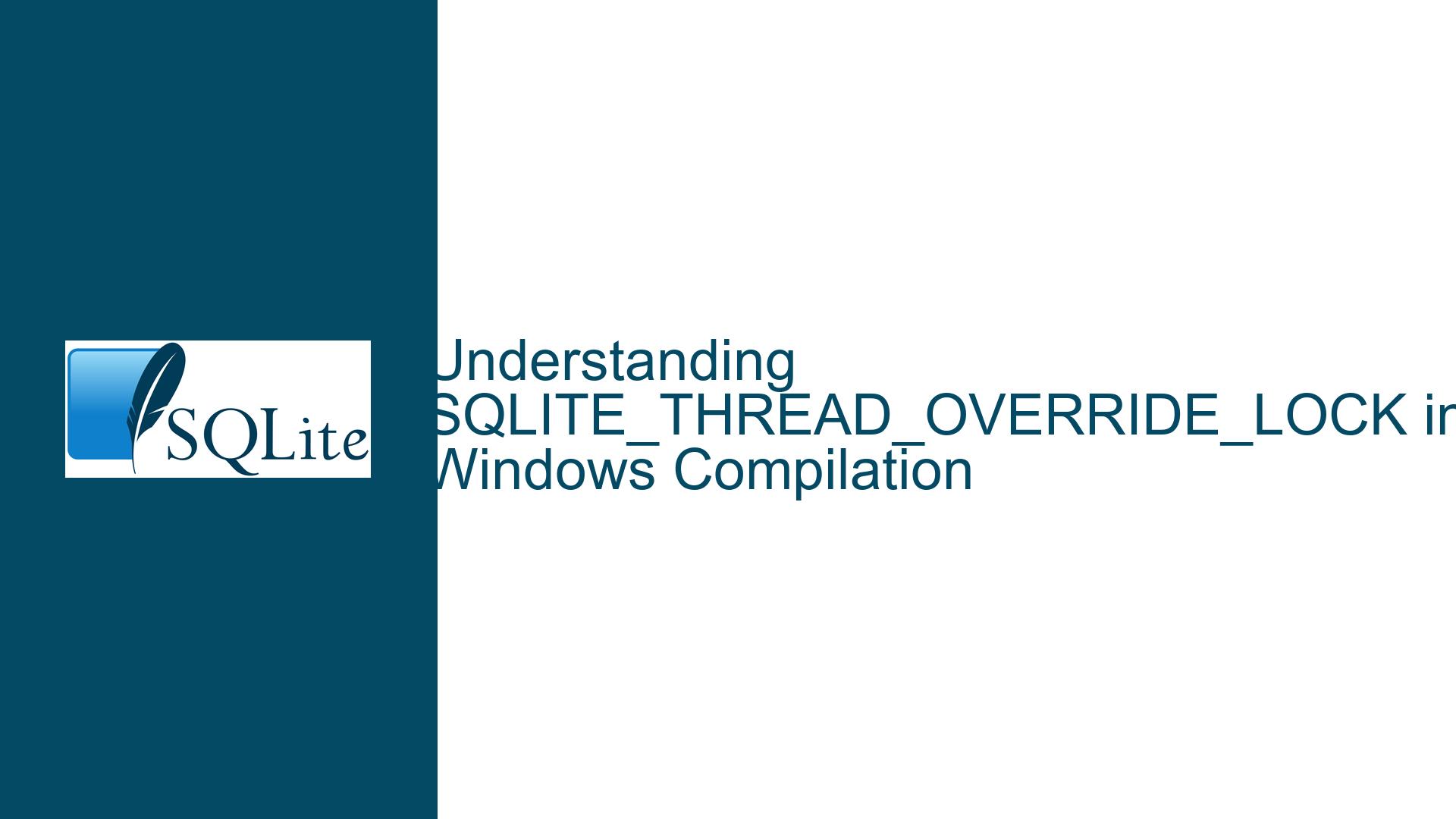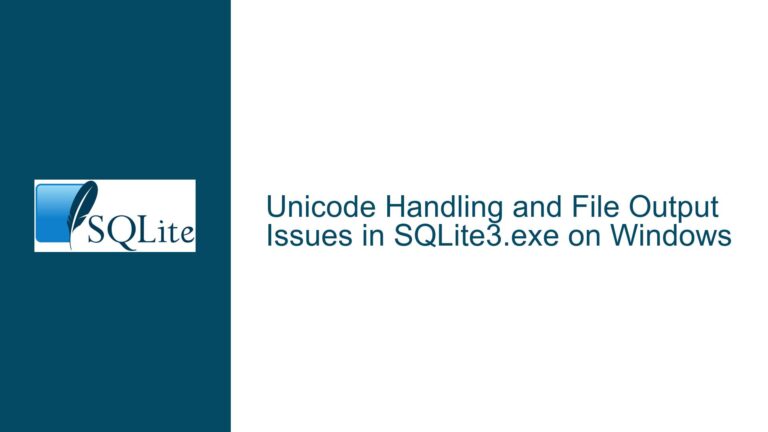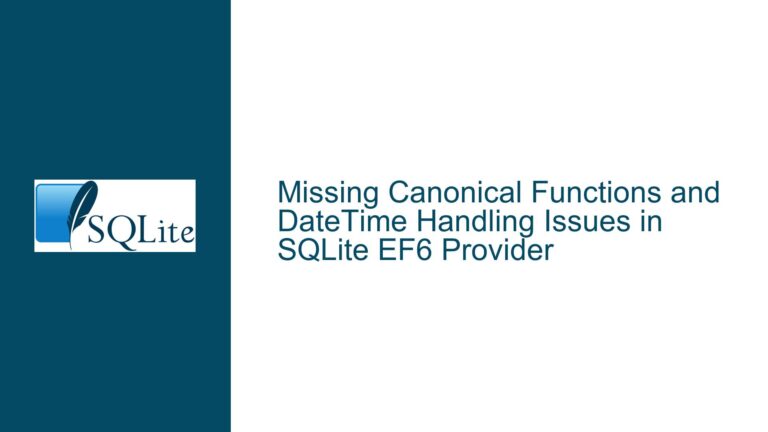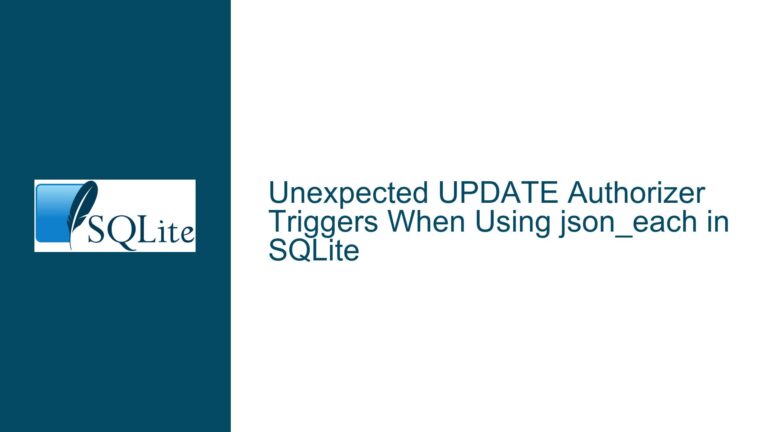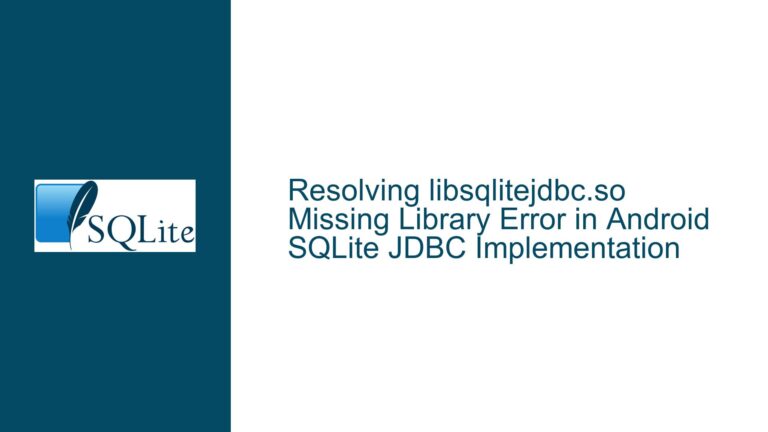SQLITE_THREAD_OVERRIDE_LOCK in Windows Compilation
Issue Overview: Deprecated SQLITE_THREAD_OVERRIDE_LOCK Flag in Windows Makefile
The SQLITE_THREAD_OVERRIDE_LOCK flag is a compiler option that has historically been used in SQLite’s Windows build process, specifically within the Makefile.msc file. This flag was designed to override the default threading behavior in SQLite, allowing developers to customize how SQLite handles thread synchronization and locking mechanisms. However, recent developments indicate that this flag has been deprecated, as evidenced by its absence in the latest SQLite source code and documentation. The confusion arises from its continued presence in the Windows Makefile.msc, despite its deprecation.
The deprecation of SQLITE_THREAD_OVERRIDE_LOCK suggests that SQLite’s internal threading and locking mechanisms have evolved, rendering this flag unnecessary or even problematic. The absence of references to this flag in the latest SQLite source code, such as in sqlite3.c or the sqlite-autoconf-3450300.tar.gz tarball, further supports the notion that it is no longer relevant. This raises questions about whether the flag should be removed from the Windows Makefile.msc to avoid potential issues or confusion for developers compiling SQLite on Windows.
The core issue revolves around understanding the implications of using a deprecated flag, the potential risks it poses, and the steps required to ensure that the Windows build process remains robust and up-to-date. This involves examining the historical context of the flag, its intended purpose, and the reasons for its deprecation. Additionally, it requires a thorough analysis of the current SQLite threading model and how it handles synchronization and locking in the absence of this flag.
Possible Causes: Why SQLITE_THREAD_OVERRIDE_LOCK Was Deprecated
The deprecation of SQLITE_THREAD_OVERRIDE_LOCK can be attributed to several factors, including changes in SQLite’s internal architecture, improvements in threading models, and the desire to simplify the build process. Understanding these causes is essential for determining the appropriate course of action regarding the flag’s presence in the Windows Makefile.msc.
One possible cause for the deprecation is the evolution of SQLite’s threading model. SQLite has undergone significant changes in how it handles concurrency and thread safety over the years. The introduction of more sophisticated locking mechanisms, such as the use of mutexes and atomic operations, may have rendered the SQLITE_THREAD_OVERRIDE_LOCK flag obsolete. These changes could have been driven by the need to improve performance, reduce complexity, or address specific issues related to thread synchronization.
Another factor contributing to the deprecation could be the desire to standardize SQLite’s build process across different platforms. SQLite is designed to be highly portable, and maintaining platform-specific flags like SQLITE_THREAD_OVERRIDE_LOCK can complicate the build process and introduce inconsistencies. By deprecating this flag, the SQLite development team may have aimed to streamline the build process and ensure that the same threading model is used across all platforms.
Additionally, the deprecation of SQLITE_THREAD_OVERRIDE_LOCK may have been motivated by the need to reduce the potential for misuse or misconfiguration. Flags that override default behavior can lead to unintended consequences, especially if they are not well-documented or understood. By removing this flag, the SQLite team may have sought to eliminate a potential source of errors and make it easier for developers to build and use SQLite without needing to worry about low-level threading details.
Finally, the deprecation could be a result of changes in the underlying operating system or compiler support. As Windows and other platforms evolve, the threading and synchronization primitives available to developers may change, rendering certain flags unnecessary or incompatible. The SQLite team may have decided to align the library’s threading model with the latest best practices and capabilities of modern operating systems.
Troubleshooting Steps, Solutions & Fixes: Addressing the Deprecated SQLITE_THREAD_OVERRIDE_LOCK Flag
To address the issue of the deprecated SQLITE_THREAD_OVERRIDE_LOCK flag in the Windows Makefile.msc, developers should take a systematic approach to ensure that their build process remains robust and up-to-date. This involves verifying the current state of the flag, understanding its implications, and making any necessary adjustments to the build configuration.
The first step is to confirm that the SQLITE_THREAD_OVERRIDE_LOCK flag is indeed deprecated. This can be done by examining the latest SQLite source code, documentation, and release notes. Developers should look for any explicit mentions of the flag’s deprecation, as well as any changes to the threading model that might explain why the flag is no longer needed. If the flag is confirmed to be deprecated, the next step is to determine whether it is still present in the Windows Makefile.msc and whether it is being used in any custom build configurations.
Once the deprecation of the flag has been confirmed, developers should evaluate the impact of removing it from their build process. This involves testing the build with and without the flag to ensure that there are no regressions or unexpected behavior. If the flag is no longer needed, it should be removed from the Makefile.msc to avoid potential issues and simplify the build process. If the flag is still being used in custom configurations, developers should consider whether it can be safely removed or replaced with a more modern alternative.
In cases where the SQLITE_THREAD_OVERRIDE_LOCK flag is still required for specific use cases, developers should explore alternative approaches to achieve the same functionality. This might involve using different compiler options, modifying the SQLite source code, or implementing custom threading and locking mechanisms. However, given that the flag is deprecated, these approaches should be used with caution and only as a last resort.
Finally, developers should stay informed about future changes to SQLite’s threading model and build process. The SQLite development team regularly releases updates and improvements, and staying up-to-date with these changes can help prevent issues related to deprecated flags and other build configurations. By following these steps, developers can ensure that their use of SQLite remains robust, efficient, and aligned with the latest best practices.
In conclusion, the deprecation of the SQLITE_THREAD_OVERRIDE_LOCK flag in SQLite’s Windows build process is a significant change that requires careful attention from developers. By understanding the reasons for the flag’s deprecation, evaluating its impact, and taking appropriate action, developers can ensure that their build process remains robust and up-to-date. This involves confirming the flag’s deprecation, testing the build process, and exploring alternative approaches if necessary. By following these steps, developers can avoid potential issues and continue to benefit from SQLite’s powerful and flexible database engine.
